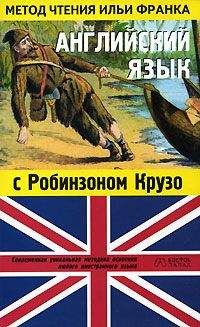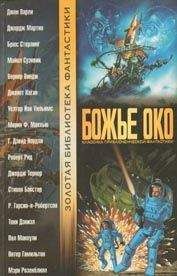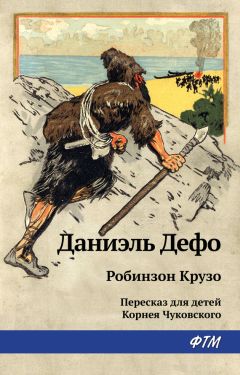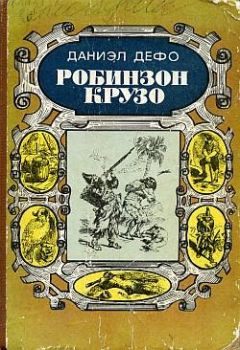James Baldwin - Английский язык с Робинзоном Крузо (в пересказе для детей) (ASCII-IPA)
What could I do but leave it in the woods where it lay?
How foolish I had been! Why had I not thought of the weight of the canoe before going to the labor of making it?
The wise man will always look before he leaps. I certainly had not acted wisely.
I went back to my castle, feeling sad and thoughtful.
Why should I be discontented and unhappy?
I was the master of all that I saw. I might call myself the king of the island.
I had all the comforts of life.
I had food in plenty.
I might raise shiploads of grain, but there was no market for it.
I had thousands of trees for timber and fuel, but no one wished to buy.
I counted the money which I had brought from the ship. There were above a hundred pieces of gold and silver; but of what use were they?
I would have given all for a handful of peas or beans to plant. I would have given all for a bottle of ink.
I MAKE AN UMBRELLA
(я делаю зонтик)
AS the years went by (пока проходили годы) the things which I had brought from the ship were used up or worn out (вещи, которые я принес с корабля, использовались /до конца/ и износились; to wear — носить /обувь, одежду/; to wear out — изнашивать).
My biscuits lasted more than a year (моего печенья хватило более чем на год); for I ate only one cake each day (так как я ел только одно печенье каждый день; cake — кекс; пирожное; торт).
My ink soon gave out (чернила вскоре иссякли; to give out — иссякать, кончаться /о запасах, силах и т. п./), and then I had no more use for pens or paper (и затем = в дальнейшем я не мог больше использовать перья и бумагу).
At last my clothes were all worn out (наконец, одежда моя была вся изношена).
The weather was always warm on my island (погода была всегда/постоянно теплой на моем острове) and there was little need for clothes (и была малая необходимость в одежде). But I could not go without them (но я не мог обходиться без нее; to go without smth. — обходиться без /чего-л./, мириться с отсутствием /чего-л./).
It so happened that I had saved the skins of all the animals I had killed (так случилось, что я сохранял шкуры всех животных, /которых/ я убил).
I stretched every skin on a framework of sticks (я растягивал каждую шкуру на каркасе из палок) and hung it up in the sun to dry (и вешал на солнце сушиться).
In time I had a great many of these skins (со временем у меня было = скопилось очень много этих шкур). Some were coarse (некоторые были грубыми) and stiff (и жесткими; stiff — тугой, негибкий, неэластичный, жесткий) and fit for nothing (и не подходили ни для чего; fit — подходящий, годный, пригодный). Others were soft to the touch and very pretty to look at (другие были мягкие на ощупь и приятные глазу: «и очень симпатичные, чтобы смотреть на них»).
One day I took one of the finest and made me a cap of it (однажды я взял одну из лучших и сделал себе шапочку из нее). I left all the hair on the outside (я оставил всю шерсть: «волосы» снаружи: «на наружней стороне»), so as to shoot off the rain (так, чтобы сбрасывать дождь = защищаться от дождя).
It was not very pretty (она была не очень красивой); but it was of great use (но была очень полезна: «была большой пользы»), and what more did I want (а чего же больше мне было желать)?
I did so well with the cap that I thought I would try something else (у меня получилось так хорошо с шапочкой, что я подумал, что я бы попытался что-нибудь еще /сделать/). So, after a great deal of trouble (после многих мучений/трудностей), I made me a whole suit (я сделал себе целый костюм).
I made me a waistcoat (я сделал жилет) and a pair of knee breeches (и пару бриджей; knee — колено; breeches — штаны, брюки). I wanted them to keep me cool rather than warm (я хотел, чтобы они «держали» меня скорее в прохладе, чем в тепле). So I made them quite loose (поэтому я сделал их довольно свободными; loose — свободный; непривязанный, неприкрепленный; просторный, широкий /об одежде/).
You would have laughed to see them (вы бы посмеялись, увидев их). They were funny things, I tell you (это были забавные вещи, скажу я вам). But when I went out in the rain (но когда я выходил наружу под дождь), they kept me dry (они не давали мне промокнуть: «сохраняли меня сухим»).
This, I think, put me in mind of an umbrella (это, я думаю, подсказало мне идею сделать зонт).
I had seen umbrellas in Brazil (я видел зонты в Бразилии), although they were not yet common in England (хотя они еще не были еще распространены в Англии; common — общий, всеобщий; общепринятый, распространенный). They were of much use in the summer when the sun shone hot (они были очень полезны летом, когда солнце светило жарко; to shine — светить).
I thought that if they were good in Brazil (я подумал, что если они были хороши в Бразилии), they would be still better here (они будут еще лучше здесь), where the sun was much hotter (где солнце было намного жарче).
So I set about the making of one (поэтому я приступил к тому, чтобы делать зонт).
I took great pains with it (это потребовало больших усилий от меня; pain — боль; мука), and it was a long time before it pleased me at all (и прошло долгое время, прежде чем он понравился мне вообще).
I could make it spread (я мог развернуть его: «заставить его развернуться»; to spread — развертывать/ся/), but it did not let down (но он не складывался: «не опускался»). And what would be the use of an umbrella that could not be folded (и какая была бы польза от зонта, который нельзя было бы сложить: «который не мог быть сложенным»)?
I do not know how many weeks I spent at this work (не знаю, сколько недель я провел за этой работой). It was play work rather than anything else (это была скорее игровая работа = легкая работа/развлечение, чем что-то другое), and I picked it up only at odd times (и я подхватывал ее только в свободное время; odd — нечетный; случайный, нерегулярный).
At last I had an umbrella that opened and shut (в конце концов у меня был зонт, который открывался и закрывался) just as an umbrella should (именно так, как зонт должен = как полагается зонту).
I covered it with skins (я покрыл его шкурами), with the hair on the outside (шерстью наружу). In the rain it was as good as a shed (в дождь он был столь же хорош, как навес). In the sun it made a pleasant shade (на солнце он давал приятную тень).
I could now go out in all kinds of weather (я мог теперь выходить в любую погоду). I need not care whether the rain fell or the sun shone (мне не приходилось беспокоиться, шел: «падал» ли дождь или светило солнце).
For the next five years I lived very quietly (следующие пять лет я жил очень спокойно). I kept always busy (я всегда находил занятие) and did not allow myself to feel lonely (и не позволял себе чувствовать себя одиноким).
I divided each day into parts according to my several duties (я делил каждый день на части в соответствии с рядом моих обязанностей; several — некоторые, несколько).
After reading in my Bible (после чтения Библии), it was my custom to spend about three hours every morning in search of food (моей привычкой было проводить примерно три часа каждое утро в поисках еды). Through the heat of the day (во время дневной жары), I busied myself in the shade of my castle or bower (я занимался = работал в тени замка или беседки).
In the evening, when the sun was low (вечером, когда солнце было низким), I worked in my fields (я работал на полях). But sometimes I went to work very early in the morning (но иногда я шел работать очень рано утром) and left my hunting until the afternoon (и оставлял охоту до послеобеденного времени).
umbrella [Vm' [email protected]], hair [' [email protected]], pretty ['prItI], whole [' [email protected]], suit [sju:t], rather ['rA: [email protected]], common [' [email protected]], busy ['bIzI], divide [dI'vaId], duty ['dju:tI], custom [' [email protected]]
I MAKE AN UMBRELLA
AS the years went by the things which I had brought from the ship were used up or worn out. My biscuits lasted more than a year; for I ate only one cake each day.
My ink soon gave out, and then I had no more use for pens or paper.
At last my clothes were all worn out.
The weather was always warm on my island and there was little need for clothes. But I could not go without them.
It so happened that I had saved the skins of all the animals I had killed.
I stretched every skin on a framework of sticks, and hung it up in the sun to dry.
In time I had a great many of these skins. Some were coarse and stiff and fit for nothing. Others were soft to the touch and very pretty to look at.
One day I took one of the finest and made me a cap of it. I left all the hair on the outside, so as to shoot off the rain.
It was not very pretty; but it was of great use, and what more did I want?
I did so well with the cap that I thought I would try something else. So, after a great deal of trouble, I made me a whole suit.
I made me a waistcoat and a pair of knee breeches. I wanted them to keep me cool rather than warm. So I made them quite loose.
You would have laughed to see them. They were funny things, I tell you. But when I went out in the rain, they kept me dry.
This, I think, put me in mind of an umbrella.
I had seen umbrellas in Brazil, although they were not yet common in England. They were of much use in the summer when the sun shone hot.
I thought that if they were good in Brazil, they would be still better here, where the sun was much hotter.
So I set about the making of one.
I took great pains with it, and it was a long time before it pleased me at all.
I could make it spread, but it did not let down. And what would be the use of an umbrella that could not be folded?
I do not know how many weeks I spent at this work. It was play work rather than anything else, and I picked it up only at odd times.
At last I had an umbrella that opened and shut just as an umbrella should.
I covered it with skins, with the hair on the outside. In the rain it was as good as a shed. In the sun it made a pleasant shade.
I could now go out in all kinds of weather. I need not care whether the rain fell or the sun shone.
For the next five years I lived very quietly. I kept always busy and did not allow myself to feel lonely.
I divided each day into parts according to my several duties.
After reading in my Bible, it was my custom to spend about three hours every morning in search of food. Through the heat of the day, I busied myself in the shade of my castle or bower.
In the evening, when the sun was low, I worked in my fields. But sometimes I went to work very early in the morning and left my hunting until the afternoon.




